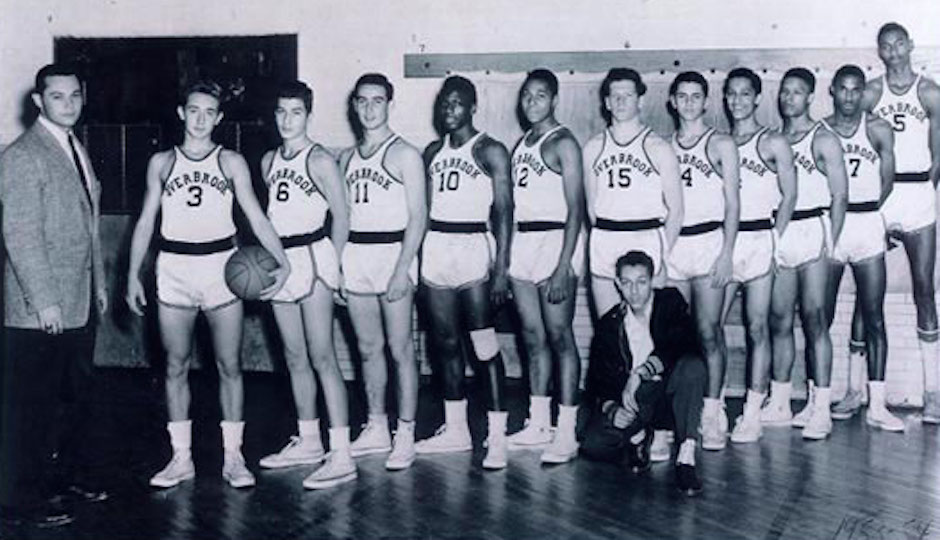Wilt Chamberlain’s High School Coach Sues Video Companies Over Documentary

Coach Cecil Mosenson (far left) and Wilt Chamberlain (far right) in 1953 Overbrook High School basketball team photo.
Back in the early 1950s, Wilt Chamberlain was just beginning his meteoric rise to fame, starting out as a varsity basketball player for West Philadelphia’s Overbrook High School. And right there with him was the school’s basketball coach, Cecil Mosenson, who would later pen the 2008 book It All Began with Wilt. Now 85 years old, Mosenson, who still lives in Philadelphia, is suing two Los Angeles-based video companies over a documentary he directed about those early days.
A few years after his book was released, Mosenson put together a DVD of film footage from Chamberlain’s time at the school, including the 1954 championship game against West Catholic at the Palestra. The former coach also interviewed players who faced off against Chamberlain for the documentary, which he fittingly titled The Greatest Player Ever.
In 2011, Mosenson (seen here with Chamberlain on the cover of the coach’s book) signed the distribution rights for the movie over to Celebrity Home Entertainment in Beverly Hills, a since-dissolved company owned by a California man named Robert Feinstein. The idea was that Feinstein’s company would get as many eyes as possible for as much money as possible and then split the proceeds with Mosenson. The deal also included other individual films and videos in Mosenson’s possession, including footage of Wilt in the famed 100-point game at Hershey Arena.
According to the lawsuit, filed in Philadelphia’s federal court on Wednesday, Feinstein struck deals with, among other video distribution services, Hulu, Amazon, iTunes and Google Play, sometimes doing business through his other company, Eye Film Releasing, which currently handles such promising titles as Alive! Is Michael Jackson Really Dead?, Raging Hormones, and I Am a Schizophrenic and So Am I. Mosenson’s film is still available to stream online on some sites, including Amazon Prime.
But Mosenson claims that he hasn’t received a single payment from Feinstein for The Greatest Player Ever. According to the complaint, Feinstein was supposed to provide him with quarterly statements of how the video was doing, but Mosenson says that he’s only received seven, most of which he claims he had to demand. He says that the information he was given contained “vague and unsubstantiated figures.”
The lawsuit, which names both companies as well as Feinstein individually, accuses Feinstein of breach of contract, fraud, and conspiracy, among other offenses. He is seeking unspecified damages in excess of $75,000.


